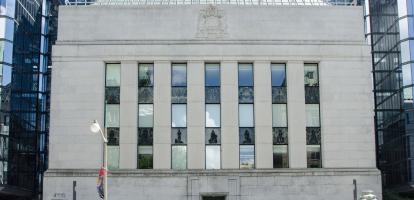Actions and promises from policy makers last week gave Canadians badly needed signs that elected leaders and officials are working to limit the impact of COVID-19 on their health and their economy.
An emergency interest-rate cut from the Bank of Canada, and its new facility to support short-term credit, will help. Relaxed capital standards to facilitate bank lending from the Superintendent of Financial Institutions are also welcome. The federal government has announced some targeted spending, and plans to make credit available through Crown lenders. Finance Minister Bill Morneau has promised more fiscal measures shortly.
Helpful though these moves and announcements are, the economic repercussions from COVID-19 threaten to exacerbate the virus’ direct impact on people’s health, and magnify the inevitable interruptions of travel and trade. Prudence and fear of contagion are keeping people away from hotels, restaurants and entertainment venues. If slower sales and payments ricochet through the economy, businesses struggling to come up with cash will buy less and pay more slowly – a vicious circle.
At the same time, the virus is confronting people, at home and in the workplace, with top-of-mind challenges. How to take care of kids when schools and other facilities are closed? How to protect employees and customers? How to balance these new demands with a schedule already packed with demands for time and attention: things to read; decisions to make; deadlines to meet?
Governments seeking to reassure Canadians and help them work through the crisis can help in many ways.
On the financial front, one kind of measure – one other countries are adopting – is grace periods for tax collections. Delaying deadlines for collections of HST and GST, for personal income-tax instalments – perhaps extending the deadlines for filing personal income-tax returns – would ease cash-flow crunches and send a vital message that the federal government understands that these are not normal times.
The current front-loading of EI and CPP payroll remittances at the beginning of the year dates from the fight against the federal deficit in the 1990s when interest rates were high; let’s suspend collections until later in the year. The Canada Revenue Agency should lower its interest rate on late payments.
Provinces could likewise delay deadlines and reduce penalties for taxes they levy. They can provide holidays or reduce rates on taxes that apply to sectors that are hurting, such as accommodation taxes on hotels, or those that are insensitive to people’s and businesses’ ability to pay, such as property taxes.
On the regulatory front, governments should do more in a few areas, and do less in others. Faster approvals for medical tests and treatments – yes. Decisive action to limit transmission of the virus – yes. Cabinet approvals for projects that could help the economy when it needs it – yes. New restrictions on products, services, business practices – no. Managers dealing with crises in their businesses – including accommodating employees who are sick, caring for loved ones or simply fearful – can at least know that things they have been doing for years will stay legal.
And the many consultations and exposure drafts that make Canadian governments’ approach to regulation-making relatively transparent? Pause those, too. The Office of the Superintendent of Financial Institutions just suspended discussions of new mortgage rules. Federal and provincial health, environment and labour ministries should follow that example. For the foreseeable future, the attention of Canada’s entrepreneurs and managers will, as it should, be elsewhere.
We need flexibility and imagination. A seizing up of the Canada-U.S. border is a threat. What if we temporarily suspended collections of duty and taxes to free resources for protection against disease while easing entry for shipments of goods and returning travellers?
Alongside big central bank moves and talk of billions in fiscal stimulus, addressing the myriad concerns afflicting Canadian families and businesses will mitigate the economic damage from the novel coronavirus.
Leaders say they feel our pain. Relieving financial stresses, and giving people time and breathing room to deal with other areas of impact, will alleviate it.
Published in the Globe and Mail
William Robson is president and CEO of the C.D. Howe Institute.





